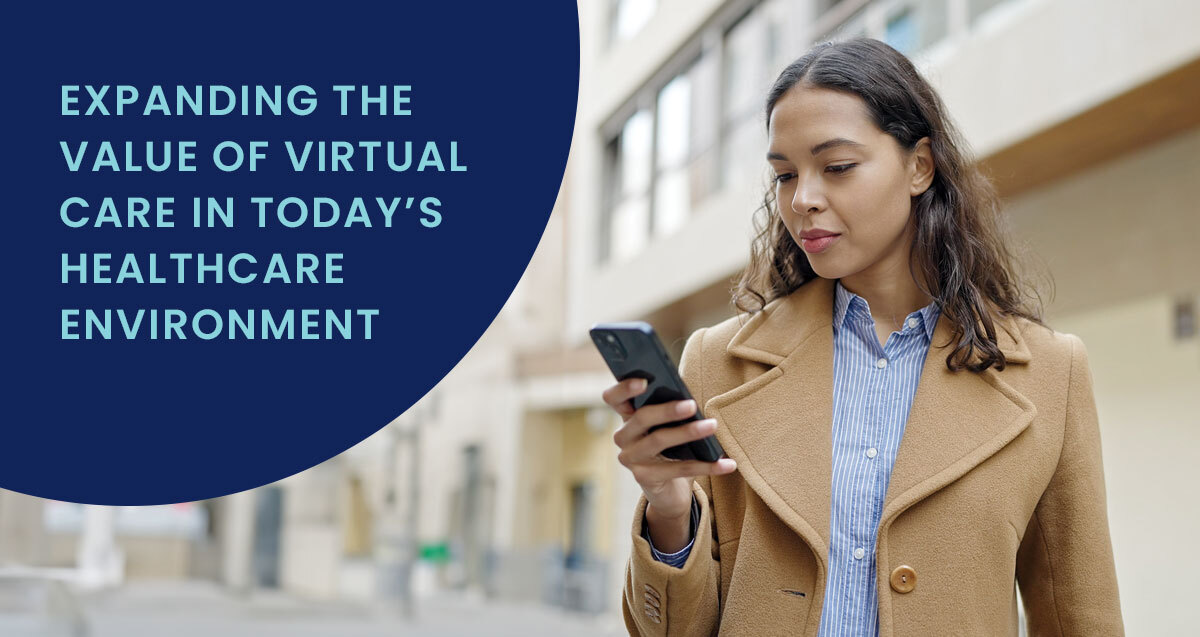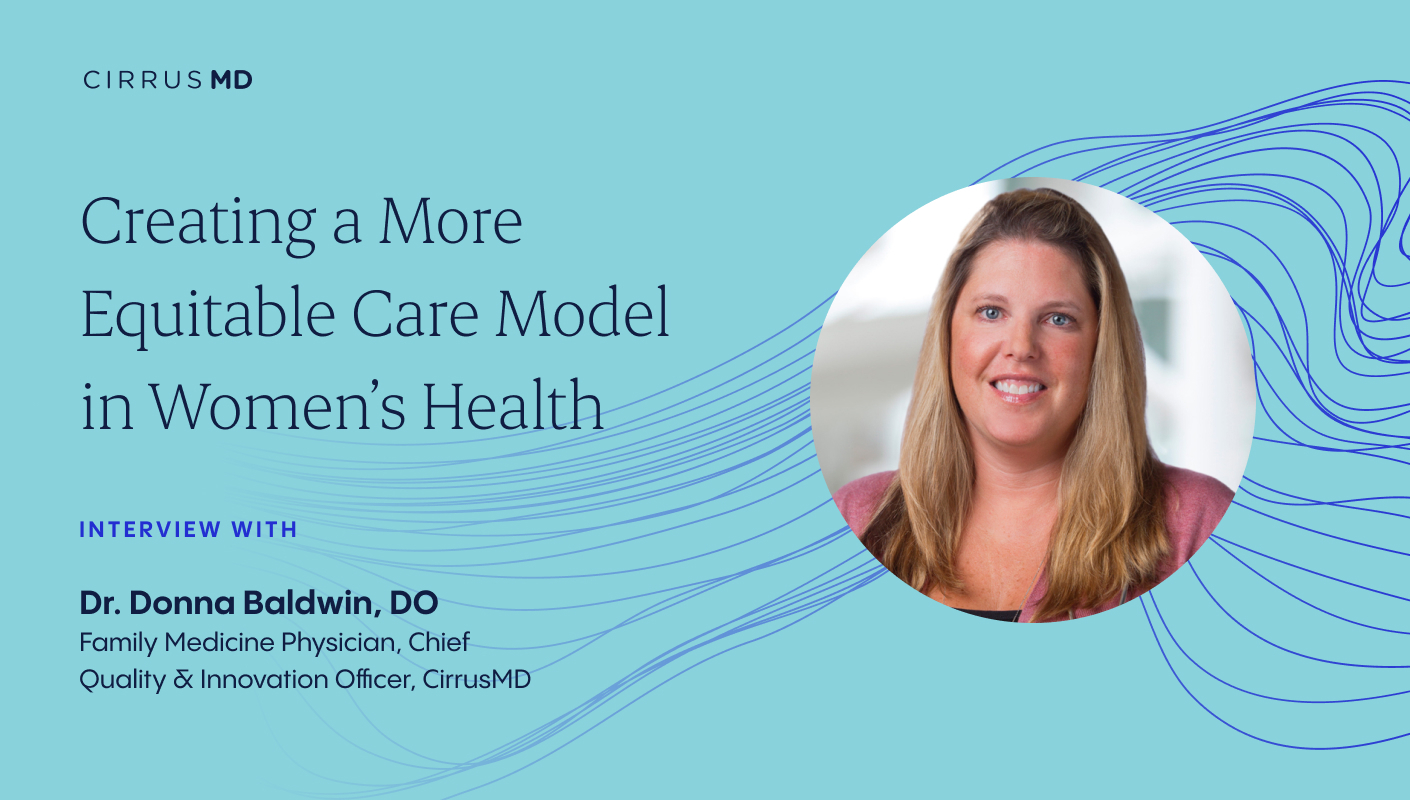Q: We talk a lot about equitable care. How does that relate to women’s health?
A: Sometimes we think of our male and female patients as presenting with the same symptoms when actually, women's bodies and makeup are quite different than that of men. It’s important for virtual doctors to individualize care and consider gender differences in how patients present. For example, symptoms of a heart attack are different and less severe in women than in men.
As a physician who has been delivering care virtually for 20 years, I’m sometimes wary of too much automation. If I’m prescribing medication, I need to consider the individual. Is the patient pregnant? Is she taking medication that may not be safe while pregnant? There are things virtual doctors must look for.
Providing equitable care across genders means not just offering the same service — an equal offering to men and women — but truly recognizing that each person has different circumstances. My focus is on reaching an equal outcome while understanding and considering the individual.
A predisposition to the male body type has long been reflected in medical training, diagnoses, and therapeutic development, which has influenced how physicians and scientists have come to understand human physiology. As a result, men and women historically can have very different health outcomes.
McKinsey & Company Unlocking Opportunities in Women’s Healthcare
Q: How can a telemedicine platform support women’s health?
A: At CirrusMD, we’re doing a lot to support women’s health — in fact, over 65% of patient encounters on the CirrusMD platform are with women. As we think about women’s health, there are a few important considerations:
- We see that women frequently struggle to receive equitable and equal care. This is where telemedicine can assist, as a gender-neutral bridge that crosses a wide range of barriers, including socio-economic and geographic.
- We see how a text-based, on-demand approach to care can truly meet women’s needs, especially when they’re bound by busy schedules; they’re working moms or caregivers for other family members. They need care or answers fast, on their schedule. They’re not able to wait weeks for an appointment. So we focus on delivering care that meets a woman’s needs in many different conditions and situations.
- It’s not just that women are frequently patients on the CirrusMD platform. Often they’re making healthcare decisions for family members. We try to make it easy for women to get help, regardless of the situation.
Q: What kinds of women's health issues do you treat on the Cirrus MD platform?
A: As a female physician, one thing I love about working at CirrusMD is our ability to take care of any type of condition for which a woman may come on the platform.
It could be that she's having urinary tract infection symptoms or acute vaginal concerns. Women often have questions about changing periods or menopause. We get a lot of questions related to fertility. A woman may want to understand contraception options. Whatever the situation, we can have an immediate discussion about what’s best based on her needs.
We're here to partner with our women patients at any stage of their life, from puberty through menopause. Because our bodies change throughout our lives, having someone who is compassionate and interested in discussing patients’ concerns, who can also help with follow-up, is one of the great benefits of our platform.
We’ve created a very comfortable environment. We don’t have to rush a patient. On our text platform, we spend an average of 25-30 minutes chatting with a patient, and it really helps our women patients feel heard. We don’t just give them a prescription; we provide the genuine assistance a woman needs and answers to the questions she may have.
Despite reporting more severe levels, frequency, and duration of pain, reports show that women are less likely to be treated for pain; their symptoms are at times expressed as “emotional” or “psychosomatic.
McKinsey & Company Unlocking Opportunities in Women’s Healthcare
Q: Virtual care is becoming more and more a part of our lives. Why is women's health such an important component?
A: Women often feel underserved. That may be because they don’t have time to take care of themselves. As a woman, mother, physician, I know it's difficult to take time out for myself. Virtual care offers a solution that provides easy access and doesn't have to be scheduled. The physician is there when the woman needs an answer — on her time.
We’re experiencing so many changes in our world and women’s health has become an even more important topic. I’m so proud to be part of the team of physicians at CirrusMD that’s committed to providing easy access, barrier-free care to those that feel underserved. We’re here to make it easier for women to get the help and support they need for their healthcare.
Q: To use CirrusMD, does a woman have to know what’s wrong, or have a specific definition of her issue?
A: That’s one of my favorite aspects of our service. A patient doesn’t have to know. There's no specific lane they have to choose. They can just come on and talk about whatever they're concerned about.
For example, a patient may come on the platform because they have a rash they want to talk about. And through evaluation and conversation, we come to realize that stress or anxiety is a big part of the reason the rash exists.
We’re able to consider every patient as a whole person without having to differentiate: is this patient experiencing a mental health issue, a women's health issue, or a “person” issue? We evaluate in ways that let us take care of that whole woman.
It’s a “wow” experience for patients who come on the platform and are immediately connected with a doctor. They don't have to wait, they don't have to go through a long process of registration or data entry, they get to start texting with the doctor immediately.
Our doctors present a very comfortable, nonjudgmental encounter. For example, people who are part of the LGBTQ community may find it’s easier for them to chat with a physician who is not biased, with no judgment. The anonymity of text offers a very comfortable setting, where patients never feel judged based on their appearance or lifestyle. It's a very comfortable space.
Q: Can you talk more about help for women’s mental health issues?
A: Mental health is often difficult for people to talk about. As a woman, I may feel that talking about mental health feels like I've failed or I'm not strong enough. We make it easy for women to have all types of conversations with a CirrusMD doctor, and the service can be somewhat anonymous while still caring for a patient’s needs. A patient doesn’t have to be on video, they don't have to talk to somebody on the phone. They can literally have an encounter while they’re sitting in a meeting.
More than 50% of our providers are women and that's really helpful for other women as they connect with the CirrusMD provider community. We make it easy for women to open up about mental health, and get the help and follow-up they need.
Our physicians can do active outreach to patients to follow up on mental health medications if we prescribe them, or to see how a particular intervention is working, or just to check in. We can offer coaching advice, refer a person to other in-network resources, or suggest a free app they can download to help with stress management.
Q: What are some unique considerations for employers with a high percentage of female workers?
A: I love it when an employer is considering the specific needs of their workforce. Maybe it’s a workforce made up primarily of women. Or it’s very geographically diverse, with workers in urban, suburban and rural areas. Or they have a large percentage of part-time or seasonal workers.
While the employment situations and locations may be different, women’s health issues tend to be the same, and many issues are made worse when we’re not caring for ourselves. I see employers today becoming even more committed to their employees experiencing a healthy lifestyle.
In my role at CirrusMD, I help to ensure our care is based on best practices and the most current recommendations. With so much focus on health & wellness benefits, it’s important to correctly interpret the changing landscape — especially around things like screening recommendations. Understanding wellness, understanding prevention, helping women know when they should be seen — those are the really important conversations, and we handle them very easily via telehealth.
I had a bad UTI on Sunday. Didn’t know about this until told by my insurance provider’s advice nurse. I checked it out via the website and was amazed! I quickly reached a doctor, and several questions later, had a prescription waiting at my local pharmacy. I was about to go to urgent care. This option saved me time and money and really, really worked. AWESOME!
Plan MemberPacific Northwest







